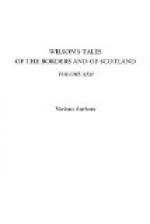“But, as I was telling ye about the auld wife, she thocht fit to read baith us a bit o’ a lecture.
“‘Now, bairns,’ said she, ’I beseech ye, think weel what ye are about; for it were better to rue at the very foot o’ the altar, than to rue it but ance afterwards, and that ance be for ever. I dinna say this to cast a damp upon your joy, nor that I doubt your affection for are another; but I say it as ane who has been a wife, and seen a good deal o’ the world; an,’ oh bairns! I say it as a mother! Marriage without love is like the sun in January—often clouded, often trembling through storms, but aye without heat; and its pillow is comfortless as a snow-wreath. But although love be the principal thing, remember it is not the only thing necessary. Are ye sure that ye are perfectly acquainted wi’ each other’s characters and tempers? Aboon a’, are ye sure that ye esteem and respect ane anither? Without this, and ye may think that ye like each other, but it’s no real love. It’s no that kind o’ liking that’s to last through married years, and be like a singing bird in your breasts to the end o’ your days. No, Jeannie, unless your very souls be, as it were, cemented thegither, unless ye see something in him that ye see in naebody else, and unless he sees something in you that he sees in naebody else, dinna marry still. Passionate lovers dinna aye mak’ affectionate husbands. Powder will bleeze fiercely awa in a moment; but the smotherin’ peat retains fire and heat among its very ashes. Remember that, in baith man and woman, what is passion to-day may be disgust the morn. Therefore, think now; for it will be ower late to think o’ my advice hereafter.’
“‘Troth, ma’am,’ said I, ‘and I’m sure I’ll be very proud to ca’ sic a sensible auld body mither!’
“‘Rather may ye be proud to call my bairn your wife,’ said she; ’for, where a man ceases to be proud o’ his wife, upon all occasions, and at all times, or where a wife has to blush for her husband, ye may say fareweel to their happiness. However, David,’ continued she, ’I dinna doubt but ye will mak’ a gude husband; for ye’re a sensible, and I really think a deservin’ lad; and were it nae mair than your name, the name o’ Stuart wad be a passport to my heart. There’s but ae thing that I’m feared on—just ae fault that I see in ye; indeed I may say it’s the beginning o’ a’ ithers, and I wad fain hae ye promise to mend it; for it has brought mair misery upon the marriage state than a’ the sufferings o’ poverty and the afflictions o’ death put thegither.’
“‘Mercy me, ma’am!’ exclaimed I, ’what de ye mean? Ye’ve surely been misinformed.’
“‘I’ve observed it mysel’, David,’ said she seriously.
“‘Goodness, ma’am! ye confound me!’ says I; ’if it’s onything that’s bad, I’ll deny it point blank.’
“‘Ye mayna think it bad,’ says she again, ’but I fear ye like a dram, and my bairn’s happiness demands that I should speak o’ it.’




